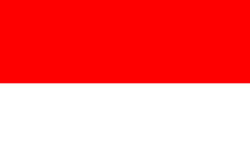The Space in Bahasa Indonesia
- Prelude to Indonesia

- Apr 9, 2025
- 2 min read
Halo^^
In today’s post, I’ll list how planets, stars, and other space materials are called in Bahasa Indonesia.
Let’s start with a general look of things.
Space = Ruang angkasa
Solar system = Tata surya
Universe = Alam semesta
Galaxy = Galaksi
Planet = Planet
Star = Bintang
Sun = Matahari or Surya (though people rarely use ‘surya’ in daily conversation)
Moon = Bulan
Meteor = Meteor
Asteroid = Asteroid
Comet = Komet

Next, we’ll look at the planets, from the closest to the furthest from the sun.
Mercury = Merkurius
Venus = Venus
Earth = Bumi
Mars = Mars
Jupiter = Jupiter
Saturn = Saturnus
Uranus = Uranus
Neptune = Neptune
Pluto = Pluto
And yes, I added Pluto here because it would be rude not to (for me)

I don’t know what else am I going to write here, as the zodiac (‘zodiak’) names in Bahasa Indonesia is more or less the same as they are in English, with only minor differences like how ‘cancer’ is written as ‘kanser’ instead (though the pronunciation is practically the same). Other than the zodiacs based on star constellations, Indonesians also have, use, and (some people) believed in the Chinese zodiac, but we call them ‘shio’ instead of ‘zodiak’.
Next, here are some man-made space-related objects in Bahasa Indonesia:
Astronaut = Astronot
Observatory = Observatory
Rocket = Roket
Space shuttle = Pesawat ulang alik
Indonesia also has a governmental space agency, though of course not to the level of, say NASA. It was called Lembaga Penerbangan daan Antariksa Nasional (LAPAN), or the National Institute of Aeronautics and Space, which then merge with a few other agencies into Badan Riset dan Inovasi Nasional (BRIN), or the National Research and Innovation Agency, back in 2021. We also have some observatories; one of the most famous, as it is the oldest, being the Bosscha Observatory, or Observatorium Bosscha, in Lembang, West Java.

Anyway, that’s all for today’s short post.
See you next time~
Trivia: our Milky Way is called Galaksi Bimasakti, with ‘Bima’ taken from the Mahabharata character Bhima and ‘sakti’ means powerful.




Comments